Well, looks like the AI community is the happiest right now as more sophisticated LLMs are getting introduced very often these days. Just recently, we saw how DeepSeek took the whole world by storm and then came Llama 4 by Meta along with the Gemma 3 model making some good noise.
But now, to extend the concept of AI automation, there is a new kid in the AI town, model context protocol (MCP). As AI capabilities continue to transform software development workflows, Model Control Protocol (MCP) servers have emerged as essential infrastructure for developers looking to harness the power of large language models in production environments. Let's understand what is MCP and what are some good MCP servers every developer should know.
A Gentle Introduction to Model Context Protocol ('MCP')
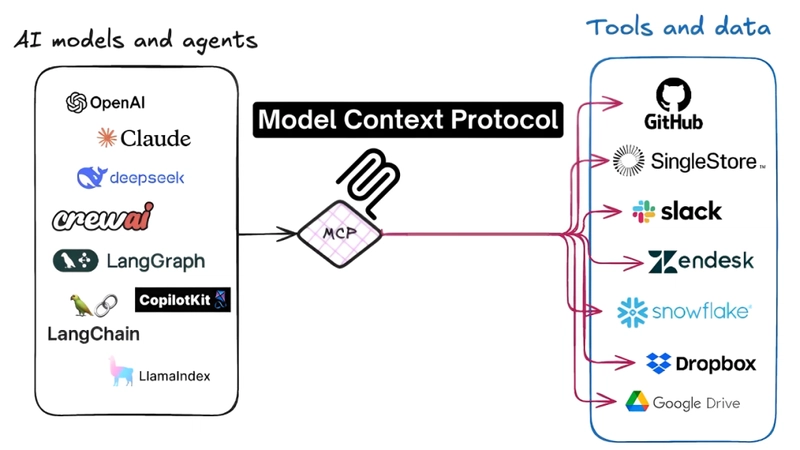
MCP has rapidly gained traction in the AI community due to its ability to standardize how AI models interact with external tools, fetch data, and execute operations.
Think of MCP (Model Context Protocol) like a USB-C port for AI applications. MCP, which started as a project by Anthropic, is now the talk of the town. Even though it was introduced a few months ago, developers have gradually begun to understand its importance. Its a protocol that’s trying to standardize how LLMs access external data and tools.
So why everyone is talking about MCP suddenly?
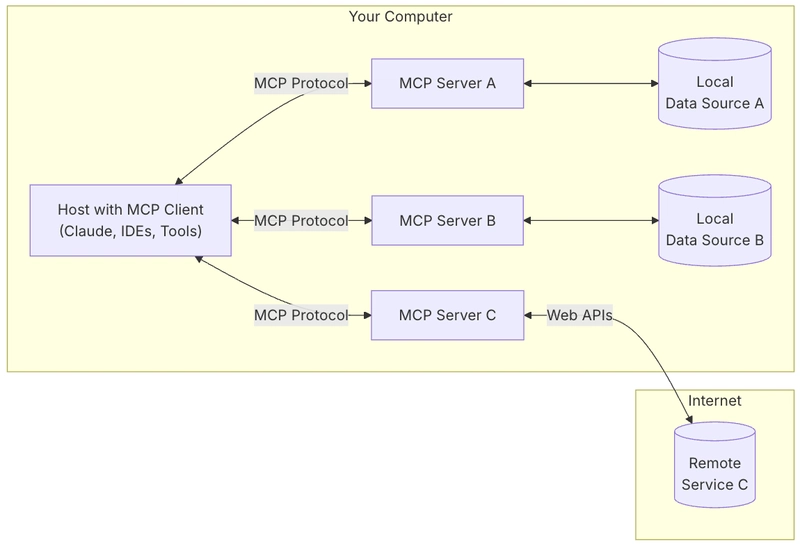
Image credits: Model Context Protocol
MCP simplifies the lives of developers by providing a standardised protocol for integrating AI agents with external tools and data sources. It promotes interoperability, reduces the need for custom integrations, and streamlines AI application development. MCP acts as a universal adapter, enabling LLMs to access real-world data and perform actions in a consistent and scalable manner.
MCP offers benefits such as enhanced context awareness, streamlined development, and improved security, making it a valuable tool for AI tool integration. The goal is for MCP to be the USB-C of AI, allowing for standardised AI model interactions.
MCP fosters an ecosystem of reusable connectors, allowing developers to build once and reuse them across multiple LLMs and clients, eliminating the need to rewrite the same integration in numerous ways. This unified data access means that with MCP, one protocol is configured, and then the LLM can "see" all registered connectors.
For example, now MCP servers let you connect Claude to powerful tools like GitHub, Slack, and Google Maps. These integrations help you save time, streamline workflows, and focus on what matters most.
MCP Architecture:
The MCP architecture is composed of three core components: MCP host, MCP client, and MCP server. These components collaborate to facilitate seamless communication between AI applications, external tools, and data sources, ensuring that operations are secure and properly managed.
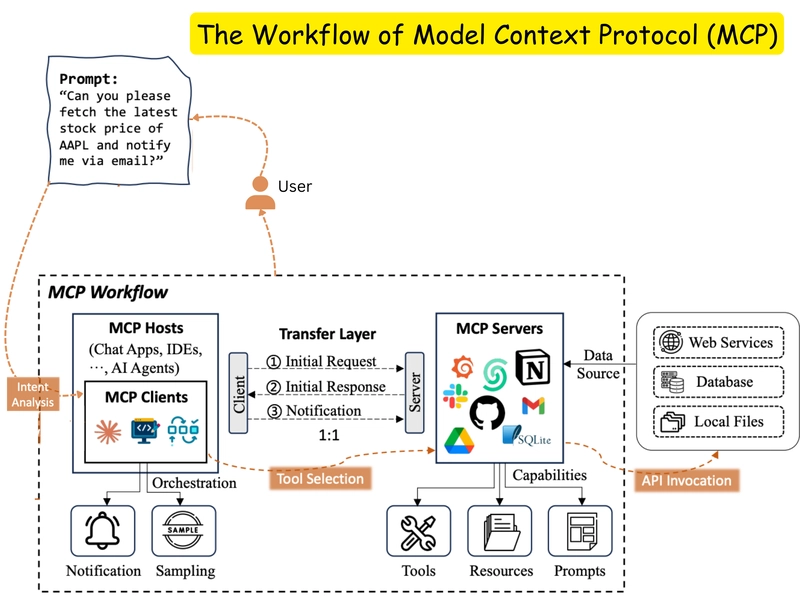
Image credits: MCP Research Paper
As shown in the image, in a typical workflow, the user sends a prompt to the MCP client, which analyzes the intent, selects the appropriate tools via the MCP server, and invokes external APIs to retrieve and process the required information before notifying the user of the results.
⮕ MCP Host: The MCP host is an AI application that provides the environment for executing AI-based tasks while running the MCP client. It integrates interactive tools and data to enable smooth communication with external services.
⮕ MCP Client: The MCP client acts as an intermediary within the host environment, managing communication between the MCP host and one or more MCP servers. It initiates requests to MCP servers, queries available functions, and retrieves responses that describe the server’s capabilities. This ensures seamless interaction between the host and external tools.
⮕ MCP Server: The MCP server enables the MCP host and client to access external systems and execute operations, offering three core capabilities: tools, resources, and prompts.
Use Cases:
➤ OpenAI: MCP Integration in AI Agents and SDKs. OpenAI has adopted MCP to standardize AI-to-tool communication, recognizing its potential to enhance integration with external tools.
➤ Cursor: Enhancing Software Development with MCP-Powered Code Assistants. Cursor uses MCP to enhance software development by enabling AI-powered code assistants that automate complex tasks.
➤ Cloudflare: Remote MCP Server Hosting and Scalability. Cloudflare has played a pivotal role in transforming MCP from a local deployment model to a cloud-hosted architecture by introducing remote MCP server hosting.
8 MCP Servers You Should Know
1. Slack MCP Server
The Slack MCP Server integrates AI assistants into Slack workspaces, enabling real-time message posting, user profile retrieval, channel management, and emoji reactions for seamless collaboration.
Why it's essential: Developers need this MCP server to automate workflows and enhance team productivity within Slack environments. By enabling AI to interact directly with Slack's infrastructure, it eliminates repetitive communication tasks and creates intelligent workflows that respond to team activities in real-time.
Custom notifications, automated responses to queries, and data aggregation from multiple channels become possible without human intervention. For development teams using Slack as their primary communication hub, this integration bridges the gap between conversation and action, allowing AI to become a proactive team member rather than just a passive tool.
2. GitHub MCP Server
The GitHub MCP Server integrates AI with GitHub's API to manage repositories, issues, pull requests, branches, and releases with robust authentication and error handling.
Why it's essential: This server transforms how developers interact with code repositories by enabling AI to perform complex GitHub operations autonomously. It's crucial for maintaining code quality by automating pull request reviews, detecting potential bugs, and ensuring consistent development practices across teams.
The GitHub MCP enables intelligent issue triaging, automated dependency updates, and proactive security vulnerability scanning without manual intervention. For organizations managing multiple repositories, it provides unprecedented efficiency by handling routine maintenance tasks, generating insightful analytics on development patterns, and even suggesting optimal reviewer assignments based on expertise and workload distribution.
3. Brave Search MCP Server
The Brave Search MCP Server provides web and local search capabilities with pagination, filtering, safety controls, and smart fallbacks for comprehensive and flexible search experiences.
Why it's essential: Developers require this server to equip their AI applications with powerful, privacy-focused search capabilities that go beyond basic queries. The Brave Search MCP delivers context-aware results that understand user intent while maintaining strict privacy standards, making it ideal for applications where data protection is paramount. Its advanced filtering capabilities enable precise information retrieval tailored to specific domains, technical documentation, or code examples.
The built-in fallback mechanisms ensure consistent performance even when primary search methods fail, providing resilience essential for production applications. For developers building knowledge management tools, research assistants, or technical documentation systems, this server provides the comprehensive search infrastructure needed without sacrificing user privacy.
4. Docker MCP Server
The Docker MCP Server executes isolated code in Docker containers, supporting multi-language scripts, dependency management, error handling, and efficient container lifecycle operations.
Why it's essential: This server is indispensable for developers who need secure, isolated environments for executing untrusted or experimental code through AI interfaces. It solves the critical challenge of running arbitrary code with proper sandboxing, preventing security vulnerabilities while still enabling powerful computation capabilities.
By managing container lifecycles automatically, it eliminates resource leaks and optimizes infrastructure costs in production environments. The multi-language support means teams can work with their preferred technologies without compromise, while dependency isolation prevents the "works on my machine" problem plaguing development teams. For applications requiring code execution as part of their functionality, this MCP server provides the infrastructure backbone that balances security, flexibility, and performance.
5. SingleStore MCP Server
The SingleStore MCP Server interacts with SingleStore databases, enabling table listing, schema queries, SQL execution, ER diagram generation, and SSL-secured connections.
Why it's essential: Database operations remain central to application development, and this MCP server revolutionizes how developers interact with data infrastructure through AI. It enables natural language querying of complex database structures, automatic schema optimization suggestions, and intelligent data modeling that would typically require database administrator expertise.
For teams working with high-performance analytics applications, the SingleStore MCP provides crucial capabilities for managing distributed SQL workloads while maintaining security through encrypted connections. The ability to generate entity-relationship diagrams from existing schemas dramatically accelerates documentation efforts and knowledge transfer between team members. As applications grow increasingly data-intensive, this server becomes the critical link between AI capabilities and database performance optimization.
Know more about SingleStore MCP server.
6. DuckDuckGo Search MCP Server
The DuckDuckGo Search MCP Server offers organic web search results with options for news, videos, images, safe search levels, date filters, and caching mechanisms.
Why it's essential: Privacy-conscious developers need this server to provide search functionality without compromising user data. Unlike other search providers, DuckDuckGo's privacy-first approach makes this MCP ideal for applications where user trust is paramount. The specialized search types (news, videos, images) enable developers to create targeted information retrieval systems that deliver precisely what users need without overwhelming them with irrelevant content.
The customizable safe search levels are crucial for applications serving diverse audiences, including educational platforms and family-friendly services. The intelligent caching mechanisms significantly reduce API costs and improve response times in production environments, making this server not just a privacy choice but also a performance optimization tool.
Get DuckDuckGo Search MCP Server.
7. Cloudflare MCP Server
The Cloudflare MCP Server provides AI integration with Cloudflare's services for DNS management and security features to optimize web infrastructure tasks.
Why it's essential: Web infrastructure management requires constant vigilance and optimization, making this MCP server invaluable for developers maintaining production systems. It enables AI-driven security response to emerging threats, automatically adjusting firewall rules and protection levels based on real-time attack patterns without human intervention. For global applications, it optimizes content delivery network settings to improve performance across diverse geographic regions and network conditions.
The automated DNS management capabilities eliminate error-prone manual configurations while enabling intelligent traffic routing during deployments or outages. As cyber threats become more sophisticated, this server provides the critical link between AI threat detection and infrastructure protection, allowing development teams to focus on building features rather than constantly managing security configurations.
8. Vectorize MCP Server
The Vectorize MCP Server connects AI assistants to organization data, enabling vector searches, deep research report generation, and text extraction from unstructured documents like PDFs with secure access to knowledge bases.
Why it's essential: Developers require this server to bridge the critical gap between AI systems and organizational knowledge, transforming static AI into dynamic assistants with real-time access to company data. Without vector search capabilities, AI applications remain limited to their training data, unable to reference your most current documentation, research, or domain-specific information.
The deep research functionality enables AI to produce comprehensive analyses combining multiple sources, essential for complex decision support systems. For companies with substantial unstructured data in PDFs and documents, the text extraction capabilities unlock previously inaccessible information. As organizations increasingly rely on proprietary knowledge as a competitive advantage, this MCP server ensures AI applications can securely leverage these assets without compromising data security.
Know more about MCP in my hands-on video.
The MCP servers highlighted in this article represent a fundamental shift in how developers can leverage AI capabilities within their existing toolchains. By providing structured, reliable interfaces to essential services like code repositories, communication platforms, search engines, and infrastructure tools, these servers enable developers to create more intelligent, responsive, and automated workflows.
The true power lies in combining these servers to create end-to-end solutions that can understand context across different systems and take appropriate actions. As AI continues to evolve, adopting these MCP servers today positions development teams to build the next generation of software solutions that blend human creativity with machine intelligence for unprecedented productivity and innovation.

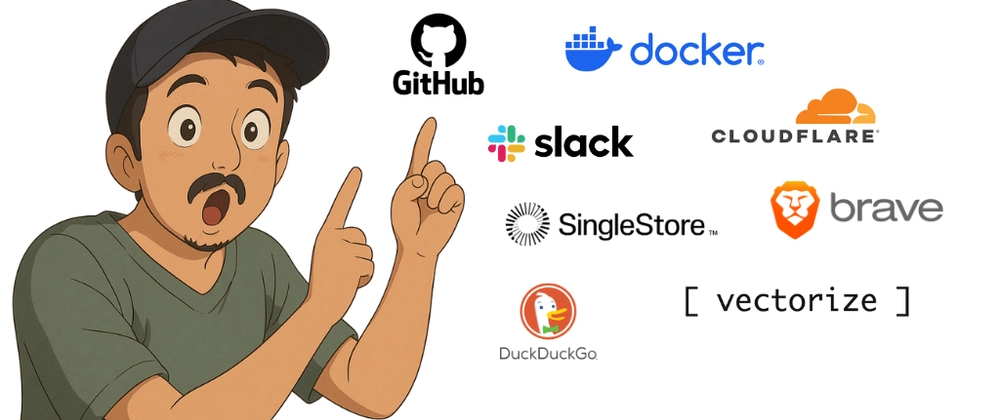
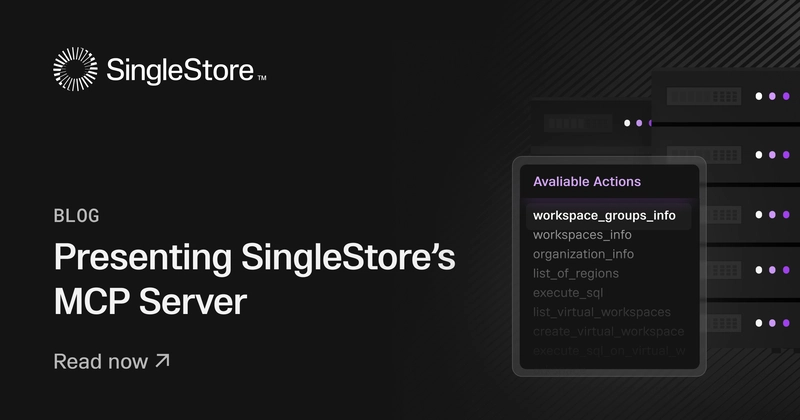



Top comments (5)
Good insights. Thanks.
try desktop commander mcp, its mind blow! i switched from cursor/windsurf to this mcp for unlimited tokens
Great topic
Great insights. Thanks.